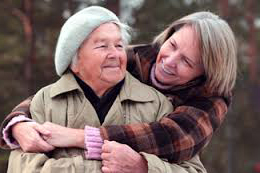Emma and her mother, Judy, are letting me share their story on this blog.
Emma is 50 and Judy is 81. Four years ago, Judy was diagnosed with Alzheimer’s. Emma wanted to spend more time with her mother, and dearly wanted to take a trip together — while they still could — but the strain of one disease on two women was evident in three short phone calls with them. They didn’t even know where they wanted, or could, go.
Emma had pretty well-defined anxieties about traveling; she readily admitted to problems dealing with hotel noise and getting lost. Worst, “Touring is complete overload,” she told me. “When I travel, everything I see reminds me of something, but I can’t remember what, and it sticks with me and piles up on me, and it’s impossible to enjoy myself.
“Oh yeah,” she said, “And I also start eating too much. Every time I can’t clear my head, I eat.”
Judy, on the other hand, was relatively carefree. Yes, Alzheimer’s is devastating, but how would you like to forget certain things that give many of us heart palpitations? Judy couldn’t remember news coverage of Malaysian Airlines flight MH 17 being shot down mid air, or suicidal German pilot Andreas Lubitz ramming a planeload of innocent travelers into the Alps. To my astonishment (happiness?) she couldn’t even recall 9/11.
“It’s on my ICE list, dear,” Judy said.
“Pick a place for us,” Emma told me. “We’re paying to pick the best place out there for us to go to. And it better not be too far.”
My mission was clear. Judy was in a wheelchair, so I ruled out a trip to Latin America; there was just no guarantee of disabled access, even in the larger cities. Still, Emma and Judy wanted an “international vacation,” so Canada became the obvious choice. Before I knew it, I was picking out flights for them from Oakland, California to Victoria, British Columbia. Being on an island sounded “manageable” to Emma, and Judy realized she wanted to see the Butchart Gardens.
The first thing I told Emma was to get her mom out of the electric wheelchair. Push her around all day, I said. You’ll interact more, you’ll get great exercise, and it will feel so different than what you’re used to. And please, Emma, don’t plan every notch of your itinerary because it will just make you feel tied down and obligated, and your mother will forget it all anyway. Victoria is a relatively small, safe, welcoming and sedate city. You don’t really have to plan anything. My hope was that Emma would be so busy seeing things through her mother’s eyes that she didn’t notice the things that normally bothered her.
Emma and Judy believed in what I had to say. On a vacation, it didn’t really matter if Judy didn’t remember anything. They were living in the moment. It didn’t even matter if Judy wouldn’t remember much of this very trip. We don’t go on adventures just to make mental keepsakes out of them; we go to exert ourselves with all five senses. Memory isn’t one of our five senses. We spend a lot of energy as a society caring for Alzheimer’s victims, so why do we emphasize “reclaiming” experiences so much? Why don’t we think more along these lines — of the exhilarating immersion in a new environment that Alzheimer’s can’t touch?
Beyond that, the irony of Emma and Judy’s experience is that Emma feared certain aspects of traveling because her mother feared them. Now that Judy wasn’t sensitized to the same old anxieties, mother and daughter couldn’t feed off each other’s worries. Relief… and more proof that fear of travel is learned, not innate. Not something that Emma would every actually admit to, of course.
I got a postcard of the Butchart Gardens that featured lipstick kisses of both ladies.
Looking back on the trip, I wrote to Emma that night, what was the worst thing you encountered?
“God,” she said, “I don’t recall.”



